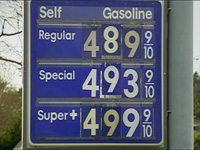Already ranked 47th among state economies in the nation, California apparently has decided to aim even lower. Following the California Assembly’s enactment of the California Global Warming Solutions Act, California’s Air Resources Board promulgated a new low-carbon fuel standard that would force out-of-state oil refiners and ethanol producers to purchase greenhouse credits from the state in order to legally import oil and ethanol into California. There’s just one problem—that violates the Commerce Clause of the U.S. Constitution, which gives Congress the exclusive authority to regulate interstate commerce.
We’ve previously discussed the dormant implications of the Commerce Clause here. The Supreme Court has repeatedly held that “a state statute that directly regulates or discriminates against interstate commerce” is “virtually per se invalid.”
In formulating California’s low-carbon rules, the state’s Air Resources Board calculated a “carbon intensity” score for different types of fuel. Among other things, the regulatory scheme assigned imported fuels a higher carbon intensity score than in-state fuels. California attempted to justify the disparity on the grounds that importers burn fuel and emit carbon when they transport fuels into the state.
A group of refiners and ethanol producers filed suit, arguing that the standards would not only hurt consumers, but would violate the Commerce Clause by discriminating against the use of renewable fuels from the Midwest and crude oil from Canada.
U.S. District Judge Lawrence O’Neill in Fresno, California agreed, and granted the plaintiffs’ request for a preliminary injunction against the regulation, which unquestionably discriminates against out-of-state producers and impermissibly attempts to regulate commercial activities outside California.
It’s bad enough that California has made a mess of its own economy, with Californians paying some of the highest fuel prices in the nation. But California should not be allowed to unilaterally raise the cost of manufacturing gasoline and diesel fuel across the entire United States.

